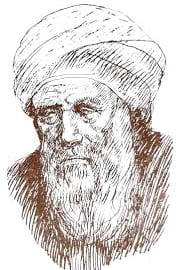Al-Ma’arri | Brief Biography
Al-Ma’arri | Brief Biography
Al-Ma’arri was a well-known Arabian philosopher, poet, and writer who lived from 973 to 1057. He was born in Ma’arra, a city in northern Syria, and was raised in a family of scholars and literary figures. Despite losing his sight at a young age, he became an accomplished writer and intellectual, and his work has had a lasting impact on the Arab world.
Al-Ma’arri was well-educated in various fields, including Arabic grammar, poetry, and philosophy. He was particularly influenced by the works of Greek philosophers, such as Aristotle, and was known for his skepticism and rationalism. He was also an advocate of vegetarianism, a stance that was highly unusual for his time.
Al-Ma’arri’s most famous work is a collection of poems, known as “The Epistle of Forgiveness,” which reflects his ethical and philosophical views. The poems express his belief in the importance of wisdom and virtue, and his rejection of the idea that there is an afterlife. He was also known for his critiques of religion, particularly his rejection of the idea that the Quran was the word of God, and his belief in the concept of free will.
In addition to his poems, Al-Ma’arri was also known for his philosophical treatises, such as “The Book of the torch,” which offers a critique of religion and the value of reason and knowledge. In this work, he argued that the pursuit of wisdom should be based on reason, rather than faith, and that humans should strive to achieve happiness in this life, rather than in an afterlife.
Al-Ma’arri’s views were often seen as controversial, and he was widely criticized by religious leaders of his time. Despite this, his works continued to be widely read and respected in the Arab world, and he is regarded as one of the most important figures in the development of Arabic philosophy and literature.
In conclusion, Al-Ma’arri was a highly influential figure in the Arab world, and his works continue to be studied and appreciated to this day. He was a pioneer in the field of Arabic philosophy and literature, and his views on ethics, religion, and the pursuit of wisdom continue to resonate with modern audiences. 0 0 0.
N. B. This article originally belongs to the book, ‘Brief Biographies of Ancient Thinkers and Writers‘ by Menonim Menonimus.
Books of Biography by M. Menonimus:
- The World Writers-Brief Biographies
- Introduction to World Writers
- Introduction to World Personalities
- Love of Reputed Persons ..
Additional Searches:











